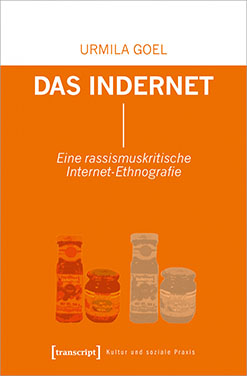Research of Urmila Goel / Research Project: The virtual second generation

Open-Acess Publication
Summary of the research project "The virtual second generation" at the Viadrina
The internet - the new global media, linking people transnationally, providing a public for the marginalised, fostering democracy - versus the internet - virtual irreality, detached from the real world, space for escape, leading to social isolation. From these extreme views research has moved to ethnographic analyses of what actually happens online. Especially young people around the world have adopted the internet as their medium, creating their own virtual spaces. The research project "The virtual second generation" analyses how, why and with what consequences second generation Indians in Germany do this. It uses as the case study the internet portal www.theinder.net.
The aim of the research project „The virtual second generation - On the negotiation of ‚ethnicity’ on the internet“ was to analyse the ‚ethnically’ defined internet portal www.theinder.net, which is made and used by ‚Indians of the second generation’ in ‚Germany’. With the aid of participant observation on- and offline as well as narrative interviews the functions this virtual space fulfils were analysed. Doing so particular emphasis was put on the multiple natio-ethno-cultural belongingness of ‘Indians of the second generation’. The research project was thus located both in internet studies and in the research on migration and racism.
The internet portal is used mainly by young people, who cannot conform to the norm of unequivocal natio-ethno-cultural belongingness. They belong to several natio-ethno-cultural contexts at the same time and experience othering and discrimination in these. The internet portal www.theinder.net is defined as their space, the space of ‘Indians of the second generation’. It offers them a space where they belong to the norm, which here implicitly is defined through multiple natio-ethno-cultural belongingness. Thus this space functions as a refuge from the experiences of racism and othering, which they encounter everyday in the spaces shaped by their ‘White’ environment. In this virtual space those, who are defined as being natio-ethno-culturally the same as them, can exchange their common experiences. Furthermore, they can obtain here information about their ascribed country of origin ‘India’. They need this as they are regularly involved by ‘White Germans’ in discussions about their supposed country of origin and risk humiliation when they cannot answer the questions. It also helps them to develop a positive context of identification. All these functions of the virtual space www.theinder.net contribute in strengthening the users in dealing with their experiences of racism and othering in other spaces.
Due to the norm of unequivocal natio-ethno-cultural belongingness many people, who experience multiple natio-ethno-cultural feelings of belongingness, wish for an unequivocal belongingness. The internet portal www.theinder.net offers the joint imagination of it to the ‘Indians of the second generation’. There they can be part of an imagined ‘Indian community’, which seems to be transnational. It, however, stays very much localised in a German-speaking context and does not offer transnational interaction. Transnationality just like the unequivocal natio-ethno-cultural belongingness are not actually established but rather jointly imagined.
In the course of the research project it was understood that while virtual spaces exhibit certain specificities, these often seem to be exaggerated in research. The internet portal www.theinder.net offers several virtual spaces which are interlinked with other virtual and physical spaces used by ‘Indians of the second generation’. The analysis of the internet portal is thus most effective when focussing on this interlinkage with other space and its internal diversity, rather than focussing on what is internet specific in this space. To focus on the complexity and interaction of diverse spaces makes direct consequences for the methodical approach necessary. It is not sufficient to simply observe the internet space, the participant observation online has to be complemented by observations offline and narrative interviews. Furthermore, internet field studies pose the question of the ethics of research in a new way.